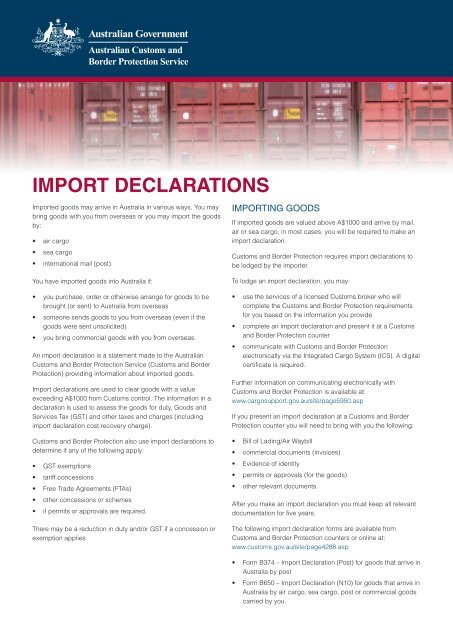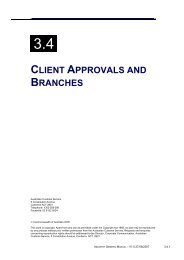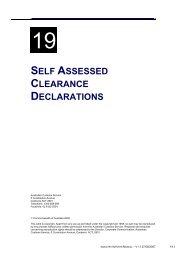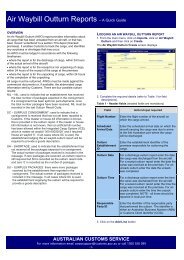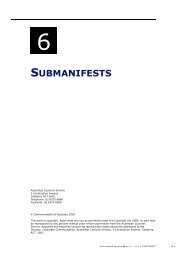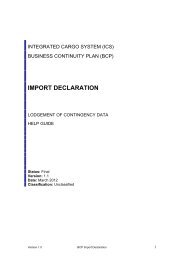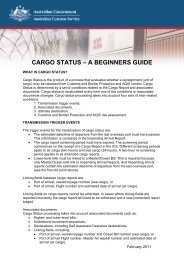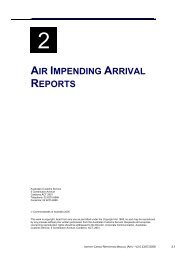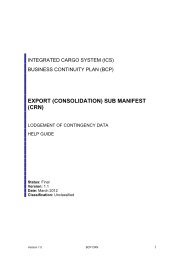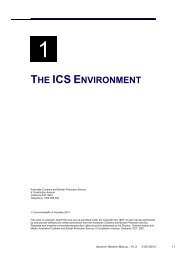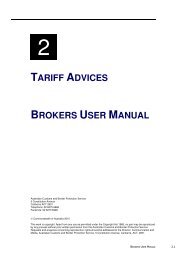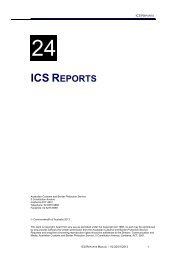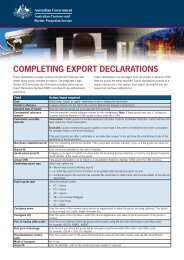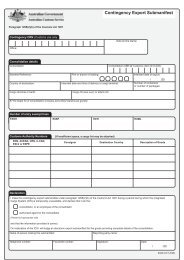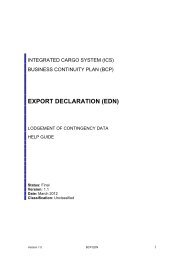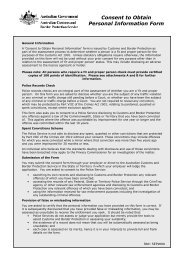IMPORT DECLARATIONS - Australian Customs Service
IMPORT DECLARATIONS - Australian Customs Service
IMPORT DECLARATIONS - Australian Customs Service
You also want an ePaper? Increase the reach of your titles
YUMPU automatically turns print PDFs into web optimized ePapers that Google loves.
import declarations<br />
Imported goods may arrive in Australia in various ways. You may<br />
bring goods with you from overseas or you may import the goods<br />
by:<br />
• air cargo<br />
• sea cargo<br />
• international mail (post).<br />
<strong>IMPORT</strong>ING GOODS<br />
If imported goods are valued above A$1000 and arrive by mail,<br />
air or sea cargo, in most cases, you will be required to make an<br />
import declaration.<br />
<strong>Customs</strong> and Border Protection requires import declarations to<br />
be lodged by the importer.<br />
You have imported goods into Australia if:<br />
• you purchase, order or otherwise arrange for goods to be<br />
brought (or sent) to Australia from overseas<br />
• someone sends goods to you from overseas (even if the<br />
goods were sent unsolicited)<br />
• you bring commercial goods with you from overseas.<br />
An import declaration is a statement made to the <strong>Australian</strong><br />
<strong>Customs</strong> and Border Protection <strong>Service</strong> (<strong>Customs</strong> and Border<br />
Protection) providing information about imported goods.<br />
Import declarations are used to clear goods with a value<br />
exceeding A$1000 from <strong>Customs</strong> control. The information in a<br />
declaration is used to assess the goods for duty, Goods and<br />
<strong>Service</strong>s Tax (GST) and other taxes and charges (including<br />
import declaration cost recovery charge).<br />
<strong>Customs</strong> and Border Protection also use import declarations to<br />
determine if any of the following apply:<br />
• GST exemptions<br />
• tariff concessions<br />
• Free Trade Agreements (FTAs)<br />
• other concessions or schemes<br />
• if permits or approvals are required.<br />
There may be a reduction in duty and/or GST if a concession or<br />
exemption applies.<br />
To lodge an import declaration, you may:<br />
• use the services of a licensed <strong>Customs</strong> broker who will<br />
complete the <strong>Customs</strong> and Border Protection requirements<br />
for you based on the information you provide<br />
• complete an import declaration and present it at a <strong>Customs</strong><br />
and Border Protection counter<br />
• communicate with <strong>Customs</strong> and Border Protection<br />
electronically via the Integrated Cargo System (ICS). A digital<br />
certificate is required.<br />
Further information on communicating electronically with<br />
<strong>Customs</strong> and Border Protection is available at:<br />
www.cargosupport.gov.au/site/page5950.asp<br />
If you present an import declaration at a <strong>Customs</strong> and Border<br />
Protection counter you will need to bring with you the following:<br />
• Bill of Lading/Air Waybill<br />
• commercial documents (invoices)<br />
• Evidence of identity<br />
• permits or approvals (for the goods)<br />
• other relevant documents.<br />
After you make an import declaration you must keep all relevant<br />
documentation for five years.<br />
The following import declaration forms are available from<br />
<strong>Customs</strong> and Border Protection counters or online at:<br />
www.customs.gov.au/site/page4288.asp<br />
• Form B374 – Import Declaration (Post) for goods that arrive in<br />
Australia by post<br />
• Form B650 – Import Declaration (N10) for goods that arrive in<br />
Australia by air cargo, sea cargo, post or commercial goods<br />
carried by you.
LODGEMENT QUESTIONS<br />
If you submit an import declaration to <strong>Customs</strong> and Border<br />
Protection you may be asked lodgement questions. These<br />
questions seek additional responses from you or your broker<br />
regarding community protection, restrictions and permits, or<br />
other information.<br />
If you completed your import declaration at a <strong>Customs</strong> and<br />
Border Protection counter, you must answer these questions<br />
in writing and submit your answers to a <strong>Customs</strong> and Border<br />
Protection office.<br />
AMENDMENTS<br />
If you need to amend your import declaration you will need<br />
to submit a new Import Declaration to a <strong>Customs</strong> and Border<br />
Protection office, or you or your broker can create a new version<br />
of the declaration electronically.<br />
DIGITAL CERTIFICATE AND CLIENT<br />
REGISTRATION<br />
Importers who choose to communicate electronically with<br />
<strong>Customs</strong> and Border Protection will need to purchase a digital<br />
certificate and register as a client in the ICS.<br />
Further information on digital certificates and client registration is<br />
available at: www.cargosupport.gov.au/site/page5950.asp<br />
evidence OF IDENTITY (eOI)<br />
If you lodge an import declaration at a <strong>Customs</strong> and Border<br />
Protection counter you will need to meet an EOI standard. EOI<br />
checks are conducted when import documents are presented<br />
to <strong>Customs</strong> and Border Protection for processing. You will need<br />
to provide 100 points of identification every time you present<br />
Iimport declaration documents to a <strong>Customs</strong> and Border<br />
Protection counter.<br />
If you are unsure about the EOI documents you need to provide,<br />
contact the <strong>Customs</strong> Information and Support Centre or refer to<br />
<strong>Australian</strong> <strong>Customs</strong> Notice No. 2009/29 available at:<br />
www.customs.gov.au/webdata/resources/notices/ACN0929.pdf<br />
CLIENT SERVICE CHARTER AND<br />
STANDARDS<br />
There are client service standards that apply when we process<br />
import declarations for you. The mode of transport to Australia<br />
determines which standard applies. Different standards apply to:<br />
• import declarations for goods that arrive by international mail<br />
• import declarations for goods that arrive by sea cargo, air<br />
cargo or other modes (e.g. carried by a passenger).<br />
Details of the standards that apply can be found in the Client<br />
<strong>Service</strong> Charter and Standards brochure available at <strong>Customs</strong><br />
and Border Protection counters or online at: www.customs.gov.<br />
au/webdata/resources/files/Client<strong>Service</strong>CharterDL-WEB.pdf<br />
FOR MORE INFORMATION<br />
You can lodge an import declaration in person at selected<br />
<strong>Customs</strong> and Border Protection offices. Please call<br />
1300 363 263 for the nearest location where you can lodge an<br />
import declaration.<br />
For more information on any importation matter, contact the<br />
<strong>Customs</strong> Information and Support Centre on 1300 363 263,<br />
email information@customs.gov.au or visit our website<br />
www.customs.gov.au<br />
It is an offence to make false declarations to<br />
customs and border protection<br />
August 2011


